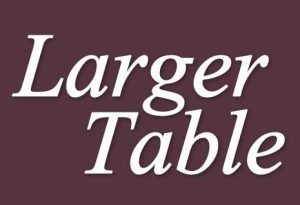by David Morstad
A new commandment I give to you, that you love one another: just as I have loved you, you also are to love one another. By this all people will know that you are my disciples, if you have love for one another. (John 13:34-35)
One another. It is stated three times just in that short verse. Jesus seemed intensely interested in our relationships. This verse is one small example. “Doing this for someone else is the same as doing it for me”, he said. “Forgive each other seventy times seven”, he said. “Feed my lambs”, he said. “Love one another as I have loved you”. No small task, that one.
But relationships are funny. Those among people with and without developmental disabilities can be especially complex. We strive to foster independence, dignity, and the relationship of equals, but we also use words like mercy and compassion, and they can sometimes create a different context. Mercy is important, but that concept comes awfully close to pity, and pity is not something known for building mutuality. Care and support are important but, left unchecked, they become more about protectiveness and paternalism. Speaking up with those in need of a stronger voice is crucial, but more than once we have found that our advocacy has become more about speaking for people than with them.
We want to do the right thing. But it’s complicated. We all, people with and without disabilities, seem to want the same thing, a mutual relationship. Why is this so hard?
It could be that, somewhere along the line, we non-disabled folk have traded away relationships in favor of services we can provide. Why? Perhaps because it is convenient, or efficient, or simply easier to legislate. One thing is certain, though, it lets us off the hook for facing our own vulnerability. As long as we are the greater, caring for the one who is lesser, we need not confront the fact that our abilities are temporary, that our knowledge has profound limits, or that our fears are very real indeed. The services we provide, however genuine, have left behind relationships that are too often artificial.
I spent a great deal of my career providing training to direct support staff who were new to the field of intellectual disability. We taught staff how to assist people with basic personal needs, how to handle difficult behavioral situations, the importance of frequent hand washing, and confidentiality regulations. We spent no time at all talking about how to confront personal weakness and vulnerability in order to build deeper communion, one that thrives on justice, equality, and mutuality.
Relationships ebb and flow. They give and take. That is not to say that relationships depend upon what we get in return. Communion is not about reciprocity. My best friends are not impressed with what I am able to provide them. Neither are they impressed by my wealth, my intellect, my good looks, my athletic ability, my sparkling personality, my public piety, or – and this is important – my complete lack of any of those things. What a coincidence. Neither is God.
Sometimes this “one another” business it gets messy. Yet just as surely as God calls you and me into the relationship, God calls grace and forgiveness into the relationship, and reveals to us an even more excellent communion.
At a national conference in 2005, a young direct support professional named Nate Hajdu, stepped to the microphone to read a short piece he had written titled simply, My Friend Charlie. In part, it reads:

In our relationships with those who have disabilities, we are offered a view of ourselves. Our real selves. Our vulnerable selves. We love and are loved in return.

Thanks for the reminder. So very true!
LikeLike